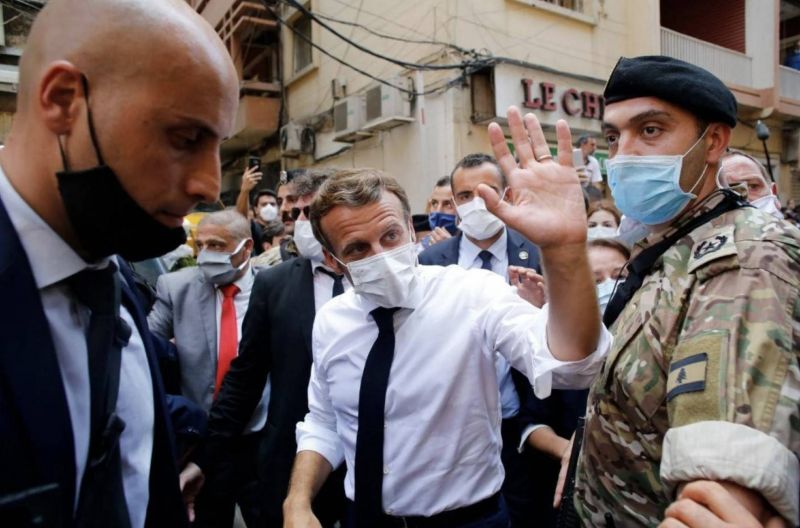
French President Emmanuel Macron in Beirut on August 6, 2020. (Credit: AFP File photo)
“France is no longer what it used to be.”
This criticism, often from the mouths of figures in the anti-Hezbollah camp, has taken on a new dimension as news circulates of Paris’ support for the presidential candidacy of Sleiman Frangieh, Zgharta’s powerful Hezbollah-backed politician.
According to diplomatic sources, France is proposing a trade of sorts, under which the presidency would go to the Iran-aligned camp’s candidate and the premiership would then go to a figure from the opposing political camp.
This formula, which is intended to serve as a compromise to end the now five-month presidential deadlock, has been categorically rejected by Saudi Arabia, which would rather not see the next president affiliated with any political side.
But what is the view from Paris?
“France does not support the accession of any particular candidate to the presidency. The swap is one of the options on the table. It is a potential way out of the presidential vacancy; it is not Paris’ position,” said a French diplomat, who requested anonymity.
Paris justified its policy with the need for “pragmatism,” as Lebanon cannot afford not to elect a new president as soon as possible. From its perspective, it will be difficult to find a way out of the presidential impasse without granting this concession of the presidency to Hezbollah and Amal.
But this “pragmatism” is facing increasing criticism in Lebanon, where it is perceived as a way to spare Hezbollah without yielding any significant result.
“The reality is that France is pandering to Hezbollah in order to maintain its influence in Lebanon, because it does not have the ability to do otherwise,” MP Antoine Habchi (Lebanese Forces/Baalbeck-Hermel) told L’Orient-Le Jour.
‘France cannot ignore Hezbollah’
These increasingly audible reproaches also emerged during the French response to the Aug. 4, 2020, Beirut port explosion. After the tragedy, and while the Iran-aligned party was singled out, French President Emmanuel Macron gathered representatives of the main political parties, including Hezbollah MP Mohammad Raad, at the Residence des Pins.
Macron then proposed a roadmap out of the Lebanese crisis, which included political reform and early parliamentary elections but it did not mention Hezbollah’s weapons.
“France opted for the hypothesis that it was a technical incident, emphasizing reform rather than Hezbollah’s responsibility,” said former MP Fares Souhaid, known for his hostility to Hezbollah.
This disappointment is all the greater in the “sovereignist” camp because France is considered a natural ally.
In 2005, after the assassination of former Prime Minister Rafik Hariri, then-French President Jacques Chirac pushed for the Syrian withdrawal and the establishment of an international tribunal.
“For us, Bashar al-Assad had crossed a red line and he had to pay,” recalled a former French diplomat.
However, the rebalancing of Paris had begun under the administration of Nicolas Sarkozy, who had welcomed Bashar al-Assad at the Élysée Palace with great pomp.
On the French side, it is now considered unfair to accuse Paris of playing into Hezbollah’s hands.
“France cannot ignore Hezbollah, especially since it was elected, notably by the Shiite Lebanese,” said the aforementioned diplomat. “Its position as an armed actor gives it considerable influence and we cannot pretend that this arsenal does not exist. This is pragmatism, not complacency,” he added.
“France says that coming to a compromise with Hezbollah is a way not to isolate the Shiite Lebanese [that the party] claims to represent. However, this community is hostage to the [Hezbollah-Amal alliance], and the elections in Lebanon, especially in these areas, are far from democratic,” replied MP Habchi, recalling the many security incidents and violations of the electoral law that took place in his district during May’s legislative elections.
Paris is one of the few actors who can boast of being able to talk to everyone on the Lebanese scene. If its policy has not helped Lebanon out of the crisis, the policy of isolating Hezbollah has not yielded significant results either.
In terms of method, unlike Saudi Arabia, France still seems to prefer political compromise to an institutional vacuum, whatever the cost. This is because Paris, unlike Riyadh, has not given up — at least for now — on its desire to play a leading role in Lebanon.
‘Tiny interests’
“In Lebanon, Iraq and Iran, France has economic interests, especially in the energy sector. In order not to lose its advantages, it plays the game of the status quo,” said Karim Salaheddine, an activist at the Lebanese American University’s secular club.
“Emmanuel Macron follows his economic, political and personal interests in Lebanon,” he added.
On the French side, these accusations are dismissed.
“France’s economic interests in Lebanon are tiny,” said the current French diplomatic source, who acknowledged, however, that Paris wishes to continue to exert influence in Lebanon.
“The Francophone and the historical ties between our two countries, as well as security considerations related to the migration issue and drug trafficking, motivate our policy,” the source added.
Political scientist Karim Bitar had a similar opinion. “France is certainly the country that continues to dialogue with all political actors for practical reasons, but we should not overestimate the proximity between France and Iran and its arms in the region, because Paris remains a Western power with excellent relations with Arab countries,” recalling the recent deterioration of relations between Paris and Tehran.
“The French policy is to maintain the stability and unity of the country, which pushes the French to appease the situation while pushing for reforms and criticizing the political class and the ‘rotten system,’” Bitar added.
However, he recognized the limits of the French policy of “pragmatism.”
“France’s ambitions have come up against the lack of flexibility of the Lebanese leaders,” he said.
In 2020, the French initiative fell through. Three years later, no lesson appears to have been learned.
This article was originally published in French in L'Orient-Le Jour. Translation by Joelle El Khoury.